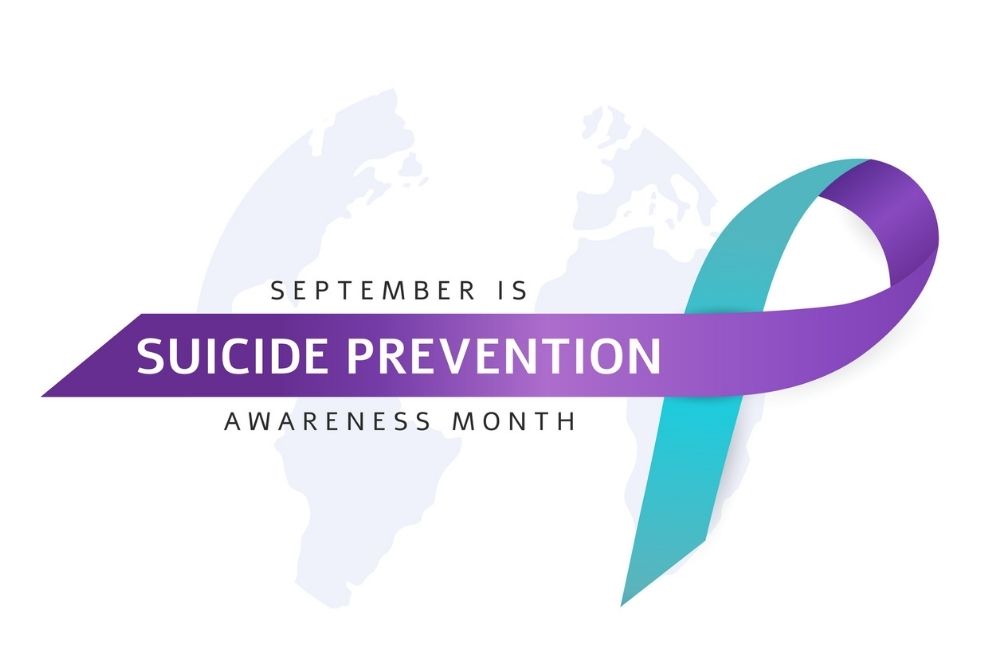It’s challenging for many people to talk about suicide, but now more than ever, it’s important to speak up and show compassion. Male residents of Indiana have a higher rate of suicide than the national average, and people ages 25–34, as well as ages 45–54, are particularly vulnerable as well. Understanding the roots of suicidal thinking is vital.
Every September, the Substance Abuse and Mental Health Services Administration (SAMHSA) uses its program Suicide Prevention Awareness Month to broadcast “the warning signs for suicide, encouraging open conversations about mental health, and connecting people to proven treatment and resources.”
What Causes Suicidal Behavior?
The Centers for Disease Control and Prevention notes that numerous risk factors contribute to suicide ideation:
- Mental health conditions. Depression, anxiety, bipolar disorder, and schizophrenia—can warp self-worth, cloud judgment, and diminish hope.
- Substance use disorder and alcohol use disorder. These conditions intensify emotional pain and weaken impulse control, especially when paired with other mental health challenges.
- Trauma. When someone is greatly affected by PTSD, complicated grief, adverse childhood experiences, systemic discrimination, and other issues, these traumatic events push even resilient individuals into crisis.
- Chronic pain. Physical discomfort that seemingly has no end can erode coping reserves and frame desperation as the only escape.
- Stressful life shifts. The death of a loved one, a relationship breakdown, financial strain, or the loss of a job are just a few examples of circumstances that feel insurmountable without support.
Youth and marginalized groups often bear an added burden: bullying, rejection, identity-based stigma, and isolation worsen their risk, especially without essential protective factors. Limited access to mental health care and fear of stigma further deepen the crisis. These combined layers signal an urgent need for empathetic response and care.
How to Spot Warning Signs
Recognizing these critical symptoms opens doors to essential conversations.
In adults, watch for:
- Withdrawal from social connections.
- Sudden shifts in sleep or appetite.
- Increased substance use.
- Expressions of hopelessness, being trapped, or feelings of burdensomeness.
- Giving away personal items or talking about ending life.
In teens and younger people, pay close attention to:
- Pulling away from friends or hobbies.
- Academic decline or difficulties concentrating.
- Frequent complaints of physical pain, such as headaches or stomachaches.
- Disrupted sleep or eating patterns.
- Risk-taking, mood swings, or self-harm behaviors.
Hotlines to Share for Immediate Assistance
When someone you love is struggling, you’re not required to have all the answers—and that’s okay. Encourage them to reach out to the following free, confidential resources:
- 988 Suicide and Crisis Lifeline: Available to everyone 24/7. Call or text 988, or use the online chat function.
- Copline: Available to current and former law enforcement personnel and their families 24/7. Call 1-800-COPLINE (267-5463).
- Fire/EMS Helpline: Available to firefighters, EMTs, rescue personnel, and their families 24/7. Call 1-888-731-FIRE (3473).
- LGBT National Hotline: Available to all members of the LGBTQIA+2s community, including youth, adults, and seniors, Monday–Saturday during specific hours. Call 888-843-4564 for the primary hotline or visit the website for other options.
- NAMI Helpline. Available to everyone in need of one-on-one emotional support, mental health information, and resources needed to tackle tough challenges, Monday–Friday 10:00 a.m.–10:00 p.m. EST. Call 1-800-950-NAMI (6264) or text ‘NAMI’ to 62640.
- National Domestic Violence Hotline: Available to everyone 24/7. Call 1-800-799-SAFE (7233), or text ‘START’ to 88788, or use the online chat function.
- RAINN National Sexual Assault Hotline: Available to everyone 24/7. Call 800-656-HOPE (4673), or text ‘HOPE’ to 64673, or use the online chat function.
- The Trevor Project Crisis Line: Available to LGBTQIA+2s youth 24/7. Call 1-866-488-7386, or text ‘START’ to 678-678, or use the online chat function.
- Veterans Crisis Line: Available to Veterans and their loved ones 24/7. Call 988, then press 1, or text 838255, or use the online chat function. You don’t have to be enrolled in VA benefits or health care to connect with caring, qualified responders.
You’ll find more essential resources through the Indiana Family and Social Services Administration.
How Can You Participate in Suicide Prevention Awareness?
SAMHSA’s toolkit divides the entire month of September into four focused weekly themes—each a milestone on the path to change.
- Sept 1–5: Understanding Risk: Embracing Treatment, Hope, and Resilience
The effort starts by recognizing that reasons for suicide are layered and complex. This week underscores the power of spotting warning signs, accessing effective care, and planting seeds of recovery—because healing looks different for everyone. - Sept 8–12: Building Community Partnerships and Supports
Now, we turn outward, tapping into the strength of peers, lived experience, and local networks. By cultivating safe, stigma-free environments, we build bridges of belonging that protect and uplift us all. - Sept 15–19: Improving Care and Outcomes for People at Risk
This is action week. It’s about ensuring pathways to care are visible and broad, building safety plans, reinforcing follow-up support, and nurturing daily self-care habits that sustain and stabilize. - Sept 22–30: Promoting Dignity Through Connection
The program ends by amplifying voices shaped by lived experience. These stories foster empathy, dismantle isolation, and remind us all that even a simple check-in can make an immeasurable difference.
Whether it’s helping a loved one get addiction treatment, providing additional resources for mental health support, or simply taking a call to reinforce how much you care, Suicide Prevention Awareness Month reminds us that connection can save lives: a shared story, a listening ear, a peace amid panic. Together, we can strengthen the safety net—and the promise of tomorrow—for every person who might be silently hurting.
Find Crucial Care at Northern Path
At Northern Path Recovery Center in Fort Wayne, IN, you matter. And so does your health. Our board-certified medical professionals are ready to help with individualized evidence-based practices, trauma-informed care, holistic well-being techniques, and dedicated aftercare. If you or a loved one needs compassionate care, reach out to our admissions team now to learn more.





